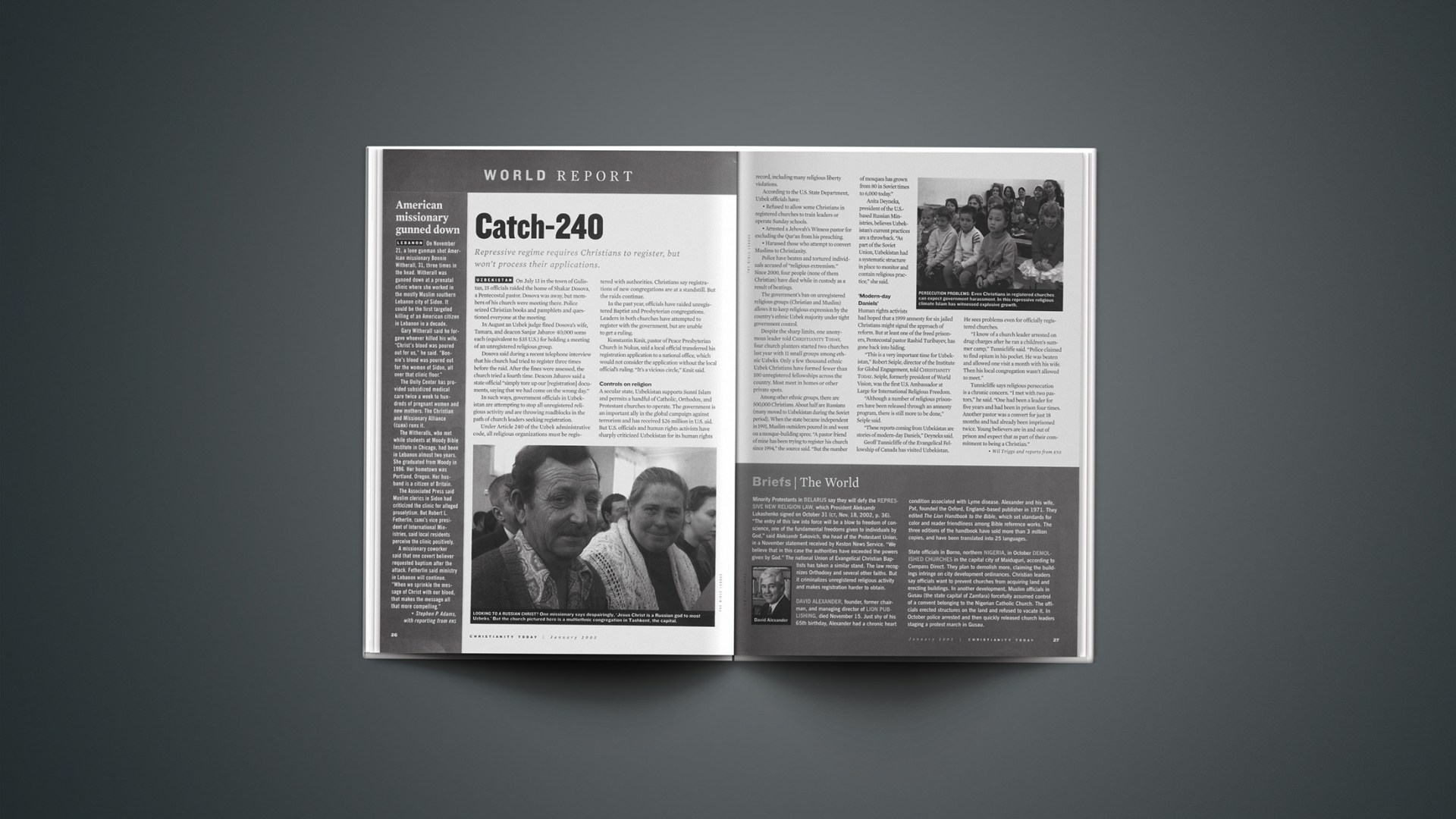On July 13 in the town of Gulistan, 15 officials raided the home of Shakar Dosova, a Pentecostal pastor. Dosova was away, but members of his church were meeting there. Police seized Christian books and pamphlets and questioned everyone at the meeting.
In August an Uzbek judge fined Dosova’s wife, Tamara, and deacon Sanjar Jabarov 40,000 soms each (equivalent to $35 U.S.) for holding a meeting of an unregistered religious group.
Dosova said during a recent telephone interview that his church had tried to register three times before the raid. After the fines were assessed, the church tried a fourth time. Deacon Jabarov said a state official “simply tore up our [registration] documents, saying that we had come on the wrong day.”
In such ways, government officials in Uzbekistan are attempting to stop all unregistered religious activity and are throwing roadblocks in the path of church leaders seeking registration.
Under Article 240 of the Uzbek administrative code, all religious organizations must be registered with authorities. Christians say registrations of new congregations are at a standstill. But the raids continue.
In the past year, officials have raided unregistered Baptist and Presbyterian congregations. Leaders in both churches have attempted to register with the government, but are unable to get a ruling.
Konstantin Kmit, pastor of Peace Presbyterian Church in Nukus, said a local official transferred his registration application to a national office, which would not consider the application without the local official’s ruling. “It’s a vicious circle,” Kmit said.
Controls on religion
A secular state, Uzbekistan supports Sunni Islam and permits a handful of Catholic, Orthodox, and Protestant churches to operate. The government is an important ally in the global campaign against terrorism and has received $26 million in U.S. aid. But U.S. officials and human rights activists have sharply criticized Uzbekistan for its human rights record, including many religious liberty violations.
According to the U.S. State Department, Uzbek officials have:
- Refused to allow some Christians in registered churches to train leaders or operate Sunday schools.
- Arrested a Jehovah’s Witness pastor for excluding the Qur’an from his preaching.
- Harassed those who attempt to convert Muslims to Christianity.
Police have beaten and tortured individuals accused of “religious extremism.” Since 2000, four people (none of them Christian) have died while in custody as a result of beatings.
The government’s ban on unregistered religious groups (Christian and Muslim) allows it to keep religious expression by the country’s ethnic Uzbek majority under tight government control.
Despite the sharp limits, one anonymous leader told Christianity Today, four church planters started two churches last year with 11 small groups among ethnic Uzbeks. Only a few thousand ethnic Uzbek Christians have formed fewer than 100 unregistered fellowships across the country. Most meet in homes or other private spots.
Among other ethnic groups, there are 500,000 Christians. About half are Russians (many moved to Uzbekistan during the Soviet period). When the state became independent in 1991, Muslim outsiders poured in and went on a mosque-building spree. “A pastor friend of mine has been trying to register his church since 1994,” the source said. “But the number of mosques has grown from 80 in Soviet times to 6,000 today.”
Anita Deyneka, president of the U.S.-based Russian Ministries, believes Uzbekistan’s current practices are a throwback. “As part of the Soviet Union, Uzbekistan had a systematic structure in place to monitor and contain religious practice,” she said.
‘Modern-day Daniels’
Human rights activists had hoped that a 1999 amnesty for six jailed Christians might signal the approach of reform. But at least one of the freed prisoners, Pentecostal pastor Rashid Turibayev, has gone back into hiding.
“This is a very important time for Uzbekistan,” Robert Seiple, director of the Institute for Global Engagement, told Christianity Today. Seiple, formerly president of World Vision, was the first U.S. Ambassador at Large for International Religious Freedom.
“Although a number of religious prisoners have been released through an amnesty program, there is still more to be done,” Seiple said.
“These reports coming from Uzbekistan are stories of modern-day Daniels,” Deyneka said.
Geoff Tunnicliffe of the Evangelical Fellowship of Canada has visited Uzbekistan. He sees problems even for officially registered churches.
“I know of a church leader arrested on drug charges after he ran a children’s summer camp,” Tunnicliffe said. “Police claimed to find opium in his pocket. He was beaten and allowed one visit a month with his wife. Then his local congregation wasn’t allowed to meet.”
Tunnicliffe says religious persecution is a chronic concern. “I met with two pastors,” he said. “One had been a leader for five years and had been in prison four times. Another pastor was a convert for just 18 months and had already been imprisoned twice. Young believers are in and out of prison and expect that as part of their commitment to being a Christian.”
Copyright © 2003 Christianity Today. Click for reprint information.
Related Elsewhere
For more articles on Uzbekistan, see Christianity TodayWorld Report.
The 2002 International Religious Freedom Report says that Uzbekistan’s “Constitution provides for freedom of religion and for the principle of separation of church and state; however, in practice the Government restricted this right.










